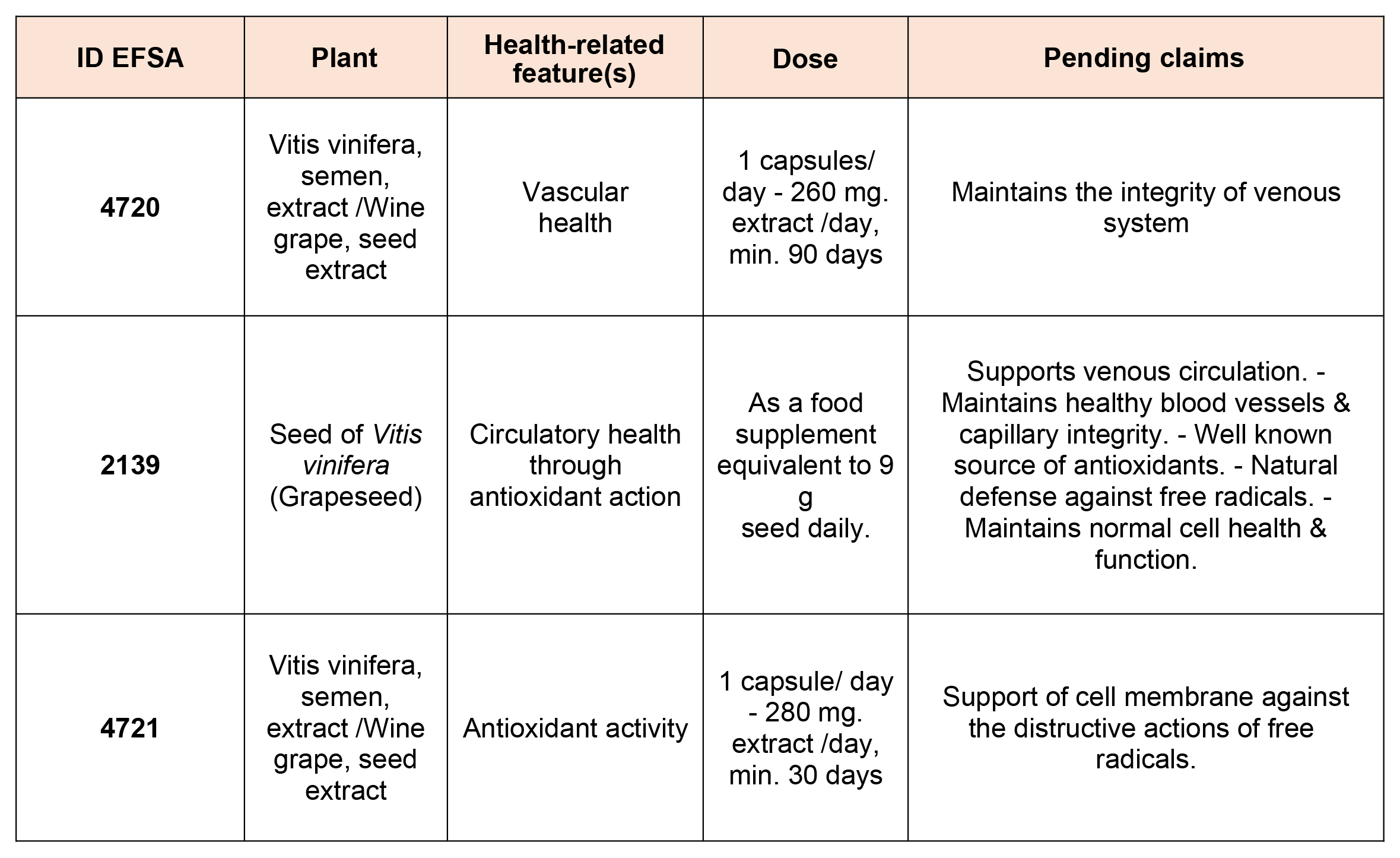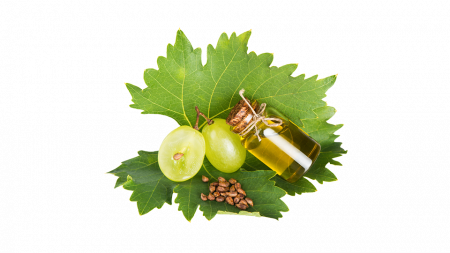
VINTERA™ - grape seed extract
Cardiovascular health, exercise recovery and cognitive health
VINTERA™ grape seed extract is an aqueous extract from white grapes (Vitis vinifera L.) that contains polyphenols, namely oligomeric proanthocyanidins (OPCs) and their monomers, favorable for cardiovascular health.
- Min. 99% OPCs and min 5% monomers
- Coproduct upcycling and sustainable production process
- Antioxidant and anti-inflammatory properties
- Reduction of blood pressure and blood lipid oxidation
VINTERA™ grape seed extract is an extract from white grapes (Vitis vinifera L.) that contains standardized amounts of polyphenols. It is available in two products:
- VINTERA™ grape seed extract: Extract with min. 99% OPCs (oligomeric proanthocyanidins) (Porter method).
Available in organic
- PREMIUM VINTERA™: Extract containing min. 99% OPCs (oligomeric proanthocyanidins) (Porter method) and min. 5%-15% OPC monomers (quantified using HPLC-DAD).
The PREMIUM extract is made from select white grape seeds and manufactured using a specific production process to obtain a higher concentration of proanthocyanidins in their monomeric form, which improves the bioavailability of the extract.
What do grape seeds contain?
Since ancient times, grapes have been prized for their medicinal and nutritional benefits. Moreover, grape seeds have been studied for more than 100 years for their powerful antioxidant properties. Grape seed extracts contain high levels of antioxidants due to their polyphenols, and their oligomeric proanthocyanidins (OPCs) in particular (Unusan et al., 2020). Gupta et al. (2020) reviewed the numerous health benefits of OPCs, namely their antioxidant and anti-inflammatory properties that have cardioprotective, neuroprotective and anti-aging effects, can heal wounds and stimulate the immune system.
What are oligomeric proanthocyanidins (OPCs)?
OPCs are natural polyphenolic compounds that are found in a variety of plants, particularly grapes, apples, cocoa and pine bark. The “French paradox” refers to the seeming contradiction that, despite diets high in saturated fats, the French have a relatively low incidence of cardiovascular disease compared with other countries with similar diets. This paradox has been attributed to the high consumption of red wine, rich in polyphenols, particularly OPCs.
OPCs are a type of flavonoid, a class of compounds known for their antioxidant and anti-inflammatory activities. OPCs are constituted of catechin and epicatechin building blocks, which are two types of flavanols (flavan-3-ols).
OPCs can be broken down into monomers, two enantiomers: catechin and epicatechin (shown below). These two basic units can form dimers, trimers or higher-level oligomers. Monomers are the most bioavailable form of OPCs due to their low molecular weight. (Unusan, 2020).
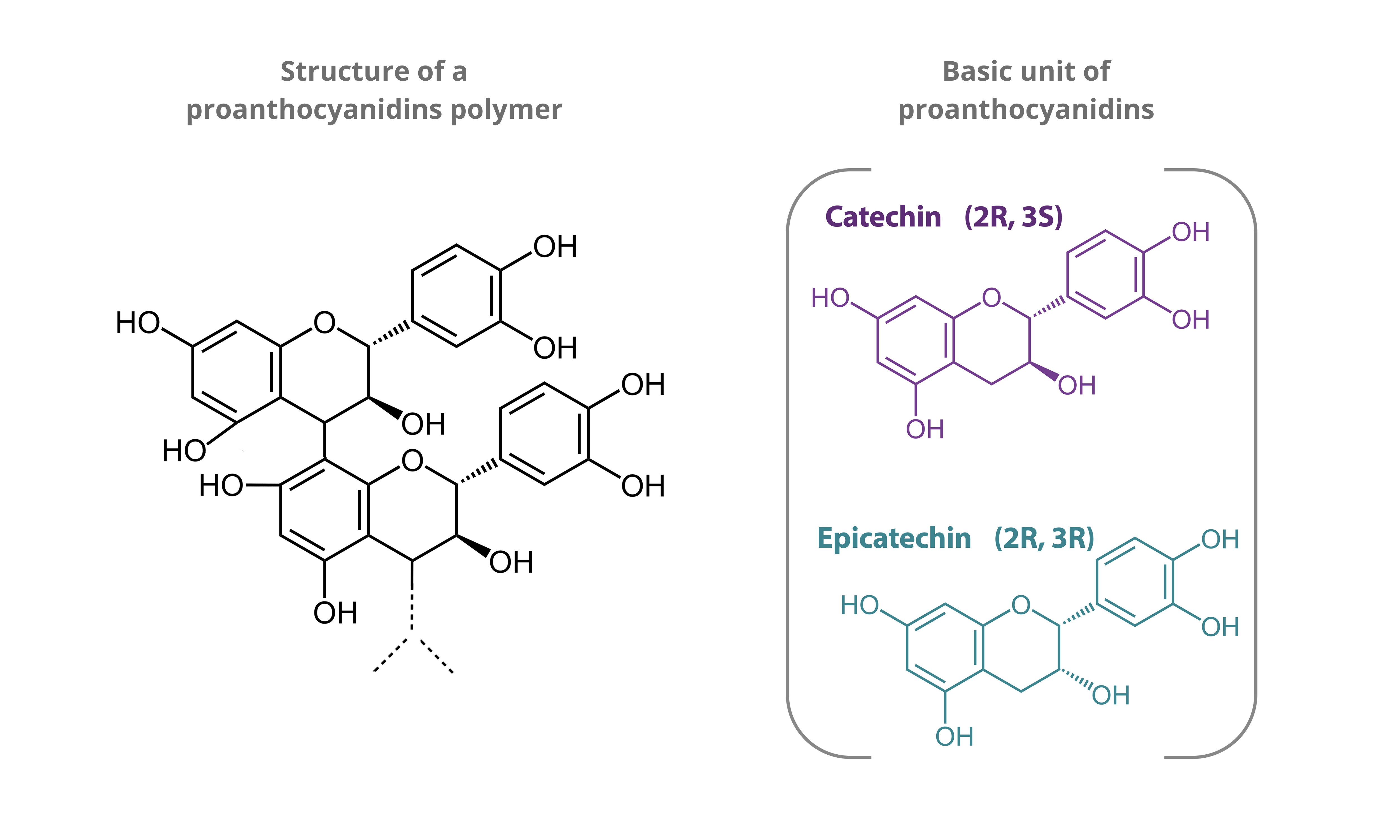
Diagram of oligomeric proanthocyanidin (OPC) structure and its monomer building blocks (excerpted from Unusan, 2020).
Sources
- Unusan, N. (2020). Proanthocyanidins in grape seeds: An updated review of their health benefits and potential uses in the food industry. Journal of Functional Foods, 67, 103861. https://doi.org/10.1016/j.jff.2020.103861
- Gupta, M., Dey, S., Marbaniang, D., Pal, P., Ray, S., & Mazumder, B. (2020). Grape seed extract : Having a potential health benefits. Journal of Food Science and Technology, 57(4), 1205‑1215. https://doi.org/10.1007/s13197-019-04113-w
3. Reduction in blood lipid oxidation
a. Cognitive health
b. Exercise recovery
1. Cardiovascular health
According to the World Health Organization (WHO), cardiovascular disease is the leading cause of death in the world with 17.7 million deaths recorded in 2015. The prevention of this disease focuses on alleviating risk factors such as high blood pressure and obesity, by adopting a healthier diet and reducing fat intake (Feringa et al., 2011) (Cardiovascular diseases (CVDs), 2017)
According to the scientific literature, grape seed extracts rich in OPCs (oligomeric proanthocyanidins) offer many advantages for cardiovascular health. OPCs are indeed powerful antioxidants known for their ability to protect the cardiovascular system by reducing various risk factors. The protective effect of proanthocyanidins acts in particular to reduce blood pressure and lipid peroxidation (Unusan et al., 2020).
2. Lowering blood pressure
The WHO forecasts that 1.5 million adults will suffer from high blood pressure by 2030. Persistent prehypertension (defined as blood pressure of 120-139/80-89 mm Hg) and high blood pressure (>140/>90 mm Hg) are risk factors for several diseases such as heart failure, stroke, atherosclerosis and chronic kidney diseases (Vaisman & Niv, 2015).
A clinical study (Odai et al. 2019) was conducted to examine the effects of a grape seed proanthocyanidin extract (GSPE) on blood pressure and the vascular endothelial function in middle-aged Japanese adults with prehypertension. In this randomized, double-blind, placebo-controlled study, 30 study participants received a daily dose of either 200 mg or 400 mg.
After 12 weeks of treatment, the group taking a daily dose of 400 mg showed a significant decrease in mean systolic blood pressure of 13 mm Hg (p=0.028).
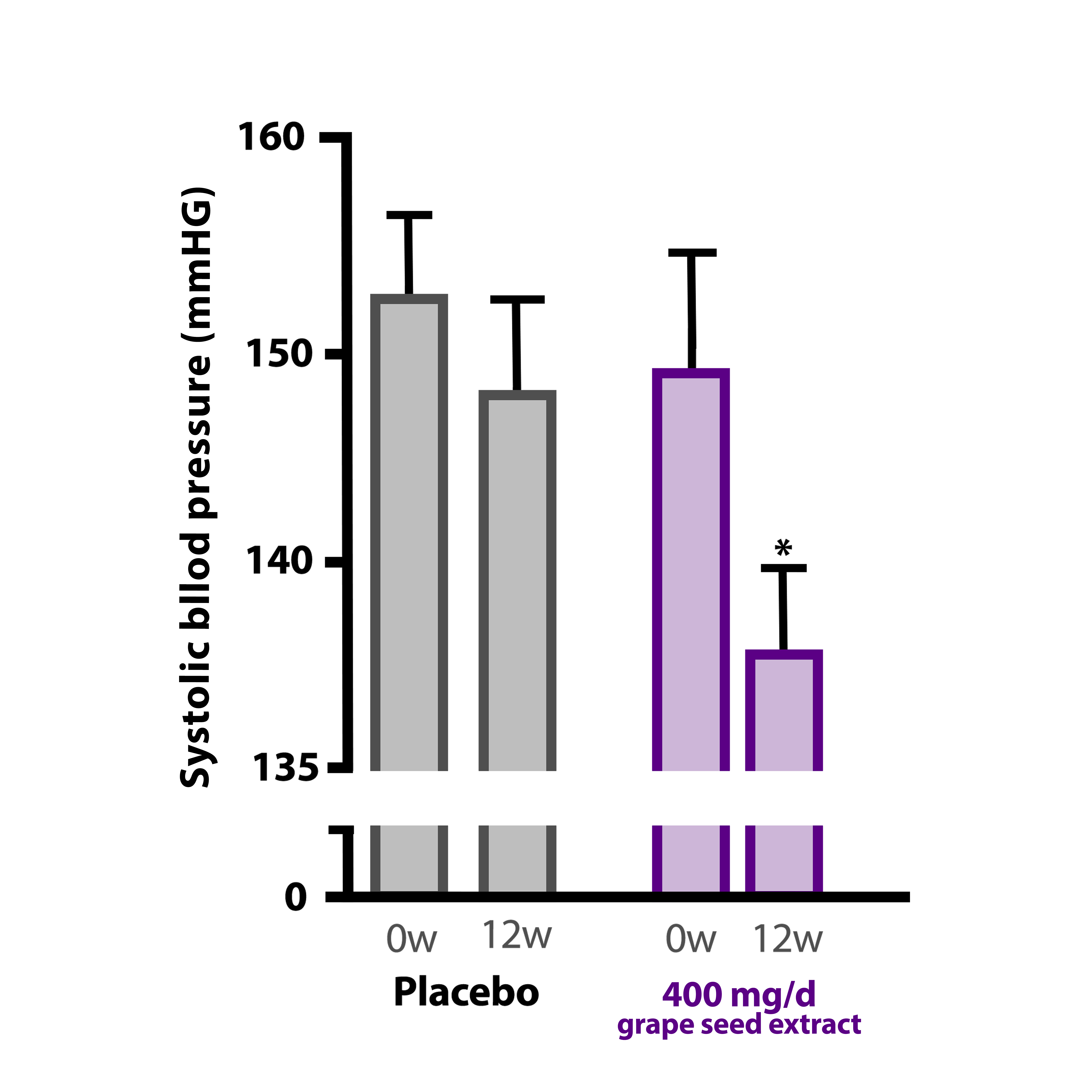
Figure 1 : Effect of supplementation with grape seed proanthocyanidin extract (GSPE) on systolic blood pressure (in mm Hg) at a daily dose of 400 mg for 12 weeks. Graph taken from Odai et al. (2019)
The study also showed a reduction in the mean diastolic blood pressure and a significant increase in vascular elasticity.
- In conclusion, after 12 weeks of supplementation with a daily dose of 400 mg of grape seed extract rich in OPCs led to a significant decrease in blood pressure and improved vascular function in healthy patients diagnosed with prehypertension. This study demonstrates the potential role that grape polyphenols may play in reducing the risk of cardiovascular accidents.
3. Reduction in blood lipid oxidation
Grape seed extracts rich in OPCs may also play a role in cardiovascular health by acting on blood lipids, that can contribute to the development of atherosclerosis. This affliction is characterized by the accumulation of plaque in the arteries, which can lead to cardiovascular disease.
Sano et al. (2007) conducted a single-blind, placebo-controlled study on 61 healthy subjects whose LDL cholesterol levels were between 100 and 180 mg/dL. The participants received a daily supplementation of 200 or 400 mg of grape seed proanthocyanidin extracts rich in OPCs for 12 consecutive weeks.
The study aimed to examine the effects of this supplementation on malondialdehyde-modified LDL, a type of oxidized LDL, a marker of blood lipid oxidation that plays an important role in the occurrence of atherosclerosis.
The results show that in the group receiving a daily dose of 200 mg, the MDA-LDL level was significantly lower (p=0.008) than basal levels, 12 weeks after supplementation began (Figure 2).
In the group receiving a daily dose of 400 mg of grape seed extract, a significant decrease in MDA-LDL levels compared with basal levels was observed as early as 6 weeks after supplementation began (Figure 2).
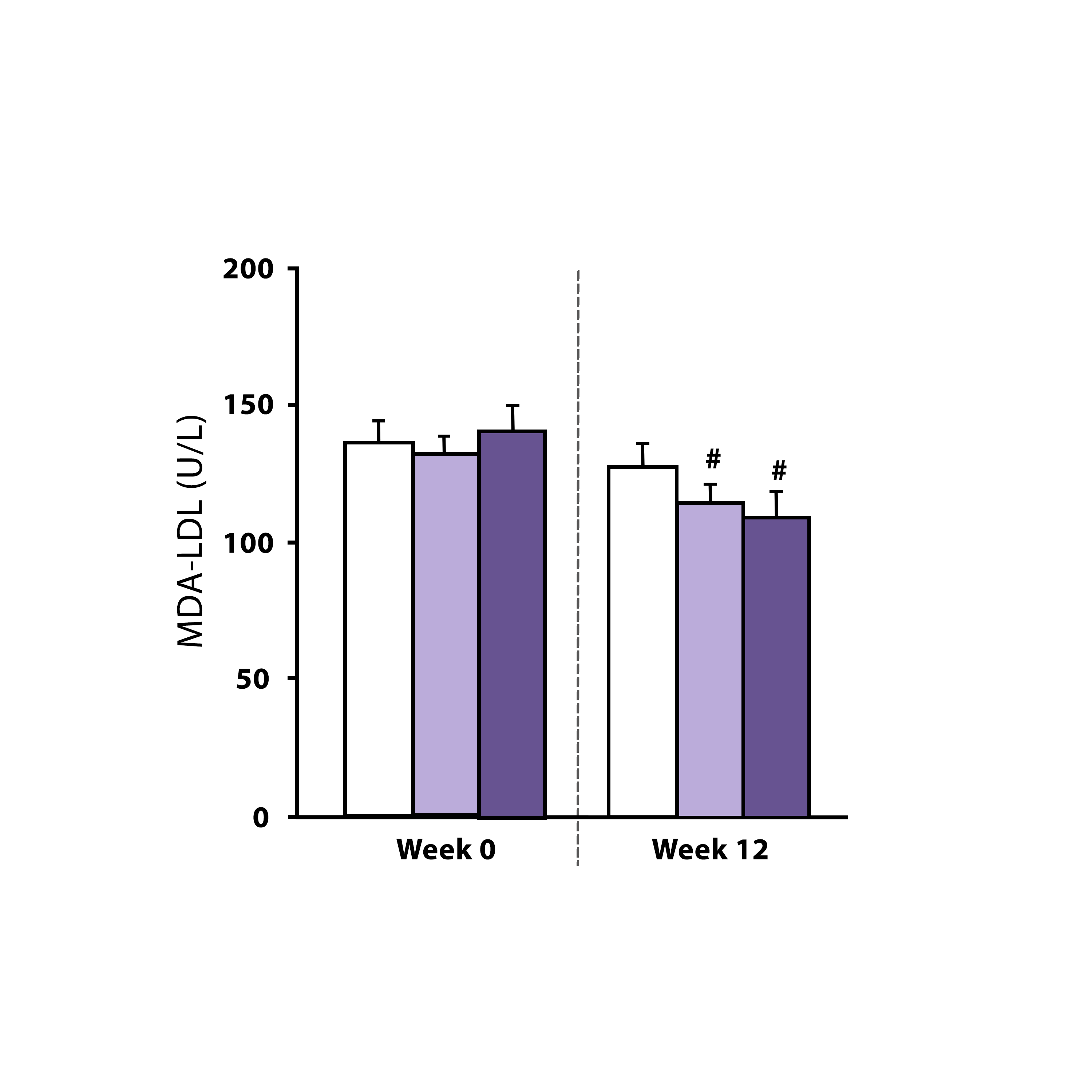 Figure 2. Effects of grape seed extract supplementation on serum MDA-LDL in high MDA-LDL/ApoB subjects. Data represent means + SE. *p<0.05 compared to placebo using the Dunnett test. # p<0.05 compared to before treatment using a paired t-test (Sano et al., 2007).
Figure 2. Effects of grape seed extract supplementation on serum MDA-LDL in high MDA-LDL/ApoB subjects. Data represent means + SE. *p<0.05 compared to placebo using the Dunnett test. # p<0.05 compared to before treatment using a paired t-test (Sano et al., 2007).
The study showed that supplementation with 200 mg of grape seed extract for 12 weeks or 400 mg for at least 6 weeks can have beneficial effects on cardiovascular health in people with high levels of LDL cholesterol. By reducing the levels of MDA-LDL, which is a marker of LDL oxidation, grape seed extract may thus contribute to reducing the risk of atherosclerosis.
4. Other health benefits
Beyond cardiovascular health, grape seed extract can also favorably affect cognitive health and exercise recovery.
a. Cognitive health
Scientific data suggest that VINTERA™ grape seed extract from Alvinesa can have beneficial effects on cognitive health. An in vivo study was conducted on VINTERA™ grape seed extract on lipid oxidation markers in mouse brains. The extract was administered for 5 days.
This study showed a decrease in the level of reactive oxygen species in mouse brains, thereby reducing inflammation, attenuating oxidation mechanisms, and preventing lipid peroxidation, which together suggest neuroprotective effects (Bobadilla et al., 2021).
VINTERA™ may thus have beneficial effects on cognitive health.
b. Exercise recovery
Scientific evidence shows possible health benefits of grape seed extracts on exercise recovery :
Hamid Reza Zolfi, Vahid Sari-Sarraf, Hossein Babaei, Amirmansour Vatankhah. The effects of grape seed extract supplementation on exercise-induced oxidative stress in young untrained males. Iranian Journal of Health Sciences. 2021.
Jooyoung Kim, Wi-Young So. Effects of acute grape seed extract supplementation on muscle damage after eccentric exercise: A randomized, controlled clinical trial. Journal of Exercise Science & Fitness. May 2019.
Sources
- Bobadilla, M., García-Sanmartín, J., & Martínez, A. (2021). Natural Food Supplements Reduce Oxidative Stress in Primary Neurons and in the Mouse Brain, Suggesting Applications in the Prevention of Neurodegenerative Diseases. Antioxidants, 10(1), Article 1. https://doi.org/10.3390/antiox10010046
- Cardiovascular diseases (CVDs). (s. d.). Consulté 14 avril 2023, à l’adresse https://www.who.int/fr/news-room/fact-sheets/detail/cardiovascular-diseases-(cvds)
- Feringa, H. H. H., Laskey, D. A., Dickson, J. E., & Coleman, C. I. (2011). The effect of grape seed extract on cardiovascular risk markers : A meta-analysis of randomized controlled trials. Journal of the American Dietetic Association, 111(8), 1173‑1181. https://doi.org/10.1016/j.jada.2011.05.015
- Gupta, M., Dey, S., Marbaniang, D., Pal, P., Ray, S., & Mazumder, B. (2020). Grape seed extract : Having a potential health benefits. Journal of Food Science and Technology, 57(4), 1205‑1215. https://doi.org/10.1007/s13197-019-04113-w
- Odai, T., Terauchi, M., Kato, K., Hirose, A., & Miyasaka, N. (2019). Effects of Grape Seed Proanthocyanidin Extract on Vascular Endothelial Function in Participants with Prehypertension : A Randomized, Double-Blind, Placebo-Controlled Study. Nutrients, 11(12), 2844. https://doi.org/10.3390/nu11122844
- Sano, A., Uchida, R., Saito, M., Shioya, N., Komori, Y., Tho, Y., & Hashizume, N. (2007). Beneficial effects of grape seed extract on malondialdehyde-modified LDL. Journal of Nutritional Science and Vitaminology, 53(2), 174‑182. https://doi.org/10.3177/jnsv.53.174
- Sochorova, L., Prusova, B., Cebova, M., Jurikova, T., Mlcek, J., Adamkova, A., Nedomova, S., Baron, M., & Sochor, J. (2020). Health Effects of Grape Seed and Skin Extracts and Their Influence on Biochemical Markers. Molecules, 25(22), 5311. https://doi.org/10.3390/molecules25225311
- Taghizadeh, M., Malekian, E., Memarzadeh, M. R., Mohammadi, A. A., & Asemi, Z. (2016). Grape Seed Extract Supplementation and the Effects on the Biomarkers of Oxidative Stress and Metabolic Profiles in Female Volleyball Players : A Randomized, Double-Blind, Placebo-Controlled Clinical Trial. Iranian Red Crescent Medical Journal, 18(9), e31314. https://doi.org/10.5812/ircmj.31314
- Unusan, N. (2020). Proanthocyanidins in grape seeds : An updated review of their health benefits and potential uses in the food industry. Journal of Functional Foods, 67, 103861. https://doi.org/10.1016/j.jff.2020.103861
- Vaisman, N., & Niv, E. (2015). Daily consumption of red grape cell powder in a dietary dose improves cardiovascular parameters : A double blind, placebo-controlled, randomized study. International Journal of Food Sciences and Nutrition, 66(3), 342‑349. https://doi.org/10.3109/09637486.2014.1000840
VINTERA™ grape seed extract is authorized for use in France in food supplements.
Vitis vinifera L. is found in Annex I of the French “Plants” decree (Decree of 24 June 2014). “Seeds” are among the authorized plant parts.
In Belgium, Vitis vinifera L. is listed in the Belgian Royal Decree of 31 August 2021 on the production and trade foodstuffs composed of or containing plants or plant preparations (authorized plant parts: fruit, leaf buds, leaves, seeds).
VINTERA™ grape seed extract is not considered a novel food as defined by Regulation (EU) 2015/2283 on novel foods.
VINTERA™ is an aqueous grape seed extract produced by Alvinesa Natural Ingredients.
VINTERA™ grape seed extract by Alvinesa is produced from the upcycling of an agricultural coproduct derived from the winemaking process, grape seeds, thereby avoiding waste.
The management of the entire supply chain, from sourcing to extraction, ensures the production of high-quality natural extracts.
The natural extract is produced in an environmentally friendly way: Alvinesa covers a high proportion of its energy needs for the production line using renewable energy and it controls its greenhouse gas emissions. (Click here to learn more about the company’s sustainable practices.)
The production plants are FSSC 22000, ISO 9001, ISO 14001 and ISO 451001 certified.
VINTERA™ grape seed extract is halal-certified and is also available with organic certification ![]() (standard version).
(standard version).
The process of producing grape seed extracts begins with the selection of white grape pomace. Carefully selected sources and the internal testing laboratory guarantee the best raw ingredients for extraction.
Grape seeds are separated from the pomace and dried.
Once dried, the grape seeds are washed to remove any remaining impurities.
The VINTERA™ grape seed extract is then obtained using aqueous extraction of grape pomace without the use of chemical solvents. The last step of the process involves spray-drying the extract.
VINTERA™ grape seed extract is available as a light brown powder with an astringent taste and dissolves in water. It can be used in food supplements packaged in single-use packets and gel tablets.
A daily dose of 300 mg is recommended by the supplier.
Vitis vinifera grape seed extracts are eligible for several “pending” health claims that are tolerated by the European Commission. These claims involve cardiovascular health, blood circulation and antioxidative activity:
